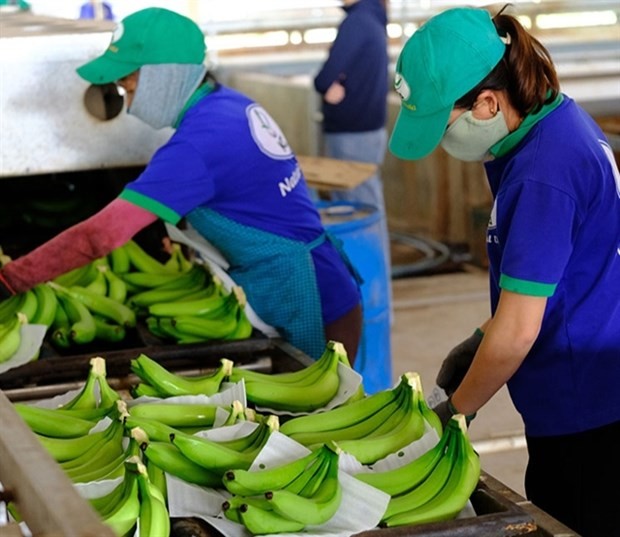
Vietnam, China negotiate phytosanitary requirements for fruit exports
Latest
 |
| Vietnam has not yet signed the protocols on phytosanitary requirements for eight export fruits, including bananas. (Photo: haiquanonline.com.vn) |
Vietnam and China are negotiating to develop phytosanitary protocols for eight kinds of Vietnamese fruits exported to China.
Currently, Vietnam has 11 kinds of fruits that are exported via official channels to China. Of these fruits, Vietnam has signed with China protocols on phytosanitary requirements for three kinds, including mangosteen, passion fruit and durian.
Meanwhile, Vietnam has not yet signed the protocols on phytosanitary requirements for eight other exported fruits, including bananas, mangoes, litchi, longans, watermelons, dragon fruit, jackfruits and rambutans.
Luong Ngoc Quang, from the Division of International Cooperation and Communications under the Plant Protection Department at the Ministry of Agriculture and Rural Development, said: "The Plant Protection Department is coordinating with the General Department of Customs of China to complete negotiation about technical exchanges and development of protocols on phytosanitary for the eight fruits."
The signing of the protocols will bring many positive business results in the long term because all trading activities for those fruits will be through a contract, according to Quang. That will help stabilise output and prices. If the fruits do not meet the quality requirements as signed in the contract, partners can refuse to receive the goods.
“To promote the official export of fruit products to China, Vietnam needs to build eligible growing areas and packaging facilities and strictly manage the use of pesticides. The Plant Protection Department has recommended these issues and has been enhancing training for localities," Quang said.
To export fresh fruit to the Chinese market, producers and exporters must comply with regulations on phytosanitary, food safety and traceability.
Shipments from growing areas or packaging facilities that have not registered to have codes from the Ministry of Agriculture and Rural Development are not licensed by the General Administration of Customs of China (GACC) to import to China.
The growing area code is a necessary and mandatory condition to export fruits to China and is also one of the factors for product traceability.
Besides that, if China discovers infected consignments, it may refuse to import them, destroy them or apply phytosanitary treatment.
Meanwhile, China will refuse or destroy all fruit imports having residue of pesticides or other toxic substances exceeding China's health and safety standards.
At the same time, GACC will immediately notify the Ministry of Agriculture and Rural Development and may suspend imports from that growing area or enterprise to China, or even that kind of fruit from Vietnam, depending on the situation.





















